#docs is where you can ACCESS google doc files
Explore tagged Tumblr posts
Text
⭐ So you want to learn pixel art? ⭐
🔹 Part 1 of ??? - The Basics!
Edit: Now available in Google Doc format if you don't have a Tumblr account 🥰
Hello, my name is Tofu and I'm a professional pixel artist. I have been supporting myself with freelance pixel art since 2020, when I was let go from my job during the pandemic.


My progress, from 2017 to 2024. IMO the only thing that really matters is time and effort, not some kind of natural talent for art.
This guide will not be comprehensive, as nobody should be expected to read allat. Instead I will lean heavily on my own experience, and share what worked for me, so take everything with a grain of salt. This is a guide, not a tutorial. Cheers!
🔹 Do I need money?
NO!!! Pixel art is one of the most accessible mediums out there.
I still use a mouse because I prefer it to a tablet! You won't be at any disadvantage here if you can't afford the best hardware or software.
Because our canvases are typically very small, you don't need a good PC to run a good brush engine or anything like that.
✨Did you know? One of the most skilled and beloved pixel artists uses MS PAINT! Wow!!
🔹 What software should I use?
Here are some of the most popular programs I see my friends and peers using. Stars show how much I recommend the software for beginners! ⭐
💰 Paid options:
⭐⭐⭐ Aseprite (for PC) - $19.99
This is what I and many other pixel artists use. You may find when applying to jobs that they require some knowledge of Aseprite. Since it has become so popular, companies like that you can swap raw files between artists.
Aseprite is amazingly customizable, with custom skins, scripts and extensions on Itch.io, both free and paid.
If you have ever used any art software before, it has most of the same features and should feel fairly familiar to use. It features a robust animation suite and a tilemap feature, which have saved me thousands of hours of labour in my work. The software is also being updated all the time, and the developers listen to the users. I really recommend Aseprite!
⭐ Photoshop (for PC) - Monthly $$
A decent option for those who already are used to the PS interface. Requires some setup to get it ready for pixel-perfect art, but there are plenty of tutorials for doing so.
Animation is also much more tedious on PS which you may want to consider before investing time!
⭐⭐ ProMotion NG (for PC) - $19.00
An advanced and powerful software which has many features Aseprite does not, including Colour Cycling and animated tiles.
⭐⭐⭐ Pixquare (for iOS) - $7.99 - $19.99 (30% off with code 'tofu'!!)
Probably the best app available for iPad users, in active development, with new features added all the time.

Look! My buddy Jon recommends it highly, and uses it often.
One cool thing about Pixquare is that it takes Aseprite raw files! Many of my friends use it to work on the same project, both in their office and on the go.
⭐ Procreate (for iOS) - $12.99
If you have access to Procreate already, it's a decent option to get used to doing pixel art. It does however require some setup. Artist Pixebo is famously using Procreate, and they have tutorials of their own if you want to learn.
⭐⭐ ReSprite iOS and Android. (free trial, but:) $19.99 premium or $$ monthly
ReSprite is VERY similar in terms of UI to Aseprite, so I can recommend it. They just launched their Android release!
🆓 Free options:
⭐⭐⭐ Libresprite (for PC)
Libresprite is an alternative to Aseprite. It is very, very similar, to the point where documentation for Aseprite will be helpful to Libresprite users.
⭐⭐ Pixilart (for PC and mobile)
A free in-browser app, and also a mobile app! It is tied to the website Pixilart, where artists upload and share their work. A good option for those also looking to get involved in a community.
⭐⭐ Dotpict (for mobile)
Dotpict is similar to Pixilart, with a mobile app tied to a website, but it's a Japanese service. Did you know that in Japanese, pixel art is called 'Dot Art'? Dotpict can be a great way to connect with a different community of pixel artists! They also have prompts and challenges often.
🔹 So I got my software, now what?
◽Nice! Now it's time for the basics of pixel art.
❗ WAIT ❗ Before this section, I want to add a little disclaimer. All of these rules/guidelines can be broken at will, and some 'no-nos' can look amazing when done intentionally.
The pixel-art fundamentals can be exceedingly helpful to new artists, who may feel lost or overwhelmed by choice. But if you feel they restrict you too harshly, don't force yourself! At the end of the day it's your art, and you shouldn't try to contort yourself into what people think a pixel artist 'should be'. What matters is your own artistic expression. 💕👍
◽Phew! With that out of the way...
🔸"The Rules"
There are few hard 'rules' of pixel art, mostly about scaling and exporting. Some of these things will frequently trip up newbies if they aren't aware, and are easy to overlook.
🔹Scaling method
There are a couple ways of scaling your art. The default in most art programs, and the entire internet, is Bi-linear scaling, which usually works out fine for most purposes. But as pixel artists, we need a different method.


Both are scaled up x10. See the difference?
On the left is scaled using Bilinear, and on the right is using Nearest-Neighbor. We love seeing those pixels stay crisp and clean, so we use nearest-neighbor.
(Most pixel-art programs have nearest-neighbor enabled by default! So this may not apply to you, but it's important to know.)
🔹Mixels
Mixels are when there are different (mixed) pixel sizes in the same image.


Here I have scaled up my art- the left is 200%, and the right is 150%. Yuck!
As we can see, the "pixel" sizes end up different. We generally try to scale our work by multiples of 100 - 200%, 300% etc. rather than 150%. At larger scales however, the minute differences in pixel sizes are hardly noticeable!
Mixels are also sometimes seen when an artist scales up their work, then continues drawing on it with a 1 pixel brush.

Many would say that this is not great looking! This type of pixels can be indicative of a beginner artist. But there are plenty of creative pixel artists out there who mixels intentionally, making something modern and cool.
🔹Saving Your Files
We usually save our still images as .PNGs as they don’t create any JPEG artifacts or loss of quality. It's a little hard to see here, but there are some artifacts, and it looks a little blurry. It also makes the art very hard to work with if we are importing a JPEG.

For animations .GIF is good, but be careful of the 256 colour limit. Try to avoid using too many blending mode layers or gradients when working with animations. If you aren’t careful, your animation could flash afterwards, as the .GIF tries to reduce colours wherever it can. It doesn’t look great!

Here's an old piece from 2021 where I experienced .GIF lossiness, because I used gradients and transparency, resulting in way too many colours.
🔹Pixel Art Fundamentals - Techniques and Jargon
❗❗Confused about Jaggies? Anti-Aliasing? Banding? Dithering? THIS THREAD is for you❗❗ << it's a link, click it!!
As far as I'm concerned, this is THE tutorial of all time for understanding pixel art. These are techniques created and named by the community of people who actually put the list together, some of the best pixel artists alive currently. Please read it!!
🔸How To Learn
Okay, so you have your software, and you're all ready to start. But maybe you need some more guidance? Try these tutorials and resources! It can be helpful to work along with a tutorial until you build your confidence up.
⭐⭐ Pixel Logic (A Digital Book) - $10 A very comprehensive visual guide book by a very skilled and established artist in the industry. I own a copy myself.
⭐⭐⭐ StudioMiniBoss - free A collection of visual tutorials, by the artist that worked on Celeste! When starting out, if I got stuck, I would go and scour his tutorials and see how he did it.
⭐ Lospec Tutorials - free A very large collection of various tutorials from all over the internet. There is a lot to sift through here if you have the time.
⭐⭐⭐ Cyangmou's Tutorials - free (tipping optional) Cyangmou is one of the most respected and accomplished modern pixel artists, and he has amassed a HUGE collection of free and incredibly well-educated visual tutorials. He also hosts an educational stream every week on Twitch called 'pixelart for beginners'.
⭐⭐⭐ Youtube Tutorials - free There are hundreds, if not thousands of tutorials on YouTube, but it can be tricky to find the good ones. My personal recommendations are MortMort, Brandon, and AdamCYounis- these guys really know what they're talking about!
🔸 How to choose a canvas size
When looking at pixel art turorials, we may see people suggest things like 16x16, 32x32 and 64x64. These are standard sizes for pixel art games with tiles. However, if you're just making a drawing, you don't necessarily need to use a standard canvas size like that.
What I like to think about when choosing a canvas size for my illustrations is 'what features do I think it is important to represent?' And make my canvas as small as possible, while still leaving room for my most important elements.
Imagine I have characters in a scene like this:
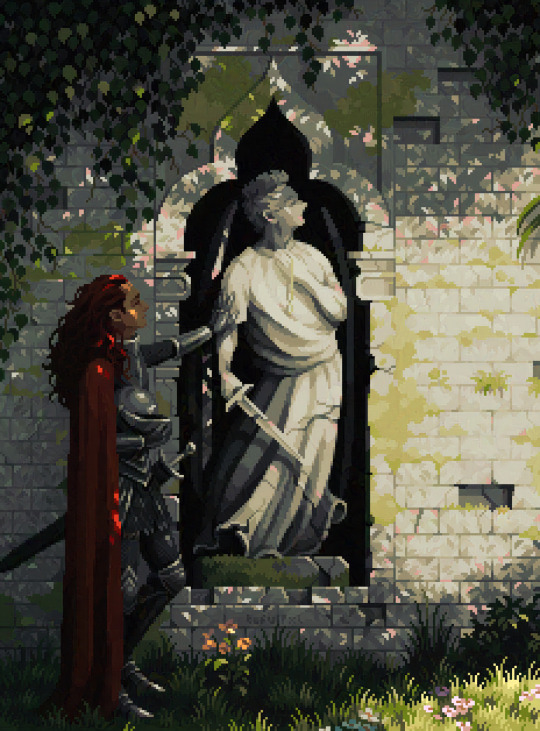
I made my canvas as small as possible (232 x 314), but just big enough to represent the features and have them be recognizable (it's Good Omens fanart 😤)!! If I had made it any bigger, I would be working on it for ever, due to how much more foliage I would have to render.
If you want to do an illustration and you're not sure, just start at somewhere around 100x100 - 200x200 and go from there.
It's perfectly okay to crop your canvas, or scale it up, or crunch your art down at any point if you think you need a different size. I do it all the time! It only takes a bit of cleanup to get you back to where you were.
🔸Where To Post
Outside of just regular socials, Twitter, Tumblr, Deviantart, Instagram etc, there are a few places that lean more towards pixel art that you might not have heard of.
⭐ Lospec Lospec is a low-res focused art website. Some pieces get given a 'monthly masterpiece' award. Not incredibly active, but I believe there are more features being added often.
⭐⭐ Pixilart Pixilart is a very popular pixel art community, with an app tied to it. The community tends to lean on the young side, so this is a low-pressure place to post with an relaxed vibe.
⭐⭐ Pixeljoint Pixeljoint is one of the big, old-school pixel art websites. You can only upload your art unscaled (1x) because there is a built-in zoom viewer. It has a bit of a reputation for being elitist (back in the 00s it was), but in my experience it's not like that any more. This is a fine place for a pixel artist to post if they are really interested in learning, and the history. The Hall of Fame has some of the most famous / impressive pixel art pieces that paved the way for the work we are doing today.
⭐⭐⭐ Cafe Dot Cafe Dot is my art server so I'm a little biased here. 🍵 It was created during the recent social media turbulence. We wanted a place to post art with no algorithms, and no NFT or AI chuds. We have a heavy no-self-promotion rule, and are more interested in community than skill or exclusivity. The other thing is that we have some kind of verification system- you must apply to be a Creator before you can post in the Art feed, or use voice. This helps combat the people who just want to self-promo and dip, or cause trouble, as well as weed out AI/NFT people. Until then, you are still welcome to post in any of the threads or channels. There is a lot to do in Cafe Dot. I host events weekly, so check the threads!
⭐⭐/r/pixelart The pixel art subreddit is pretty active! I've also heard some of my friends found work through posting here, so it's worth a try if you're looking. However, it is still Reddit- so if you're sensitive to rude people, or criticism you didn't ask for, you may want to avoid this one. Lol
🔸 Where To Find Work
You need money? I got you! As someone who mostly gets scouted on social media, I can share a few tips with you:
Put your email / portfolio in your bio Recruiters don't have all that much time to find artists, make it as easy as possible for someone to find your important information!
Clean up your profile If your profile feed is all full of memes, most people will just tab out rather than sift through. Doesn't apply as much to Tumblr if you have an art tag people can look at.
Post regularly, and repost Activity beats everything in the social media game. It's like rolling the dice, and the more you post the more chances you have. You have to have no shame, it's all business baby
Outside of just posting regularly and hoping people reach out to you, it can be hard to know where to look. Here are a few places you can sign up to and post around on.
/r/INAT INAT (I Need A Team) is a subreddit for finding a team to work with. You can post your portfolio here, or browse for people who need artists.
/r/GameDevClassifieds Same as above, but specifically for game-related projects.
Remote Game Jobs / Work With Indies Like Indeed but for game jobs. Browse them often, or get email notifications.
VGen VGen is a website specifically for commissions. You need a code from another verified artist before you can upgrade your account and sell, so ask around on social media or ask your friends. Once your account is upgraded, you can make a 'menu' of services people can purchase, and they send you an offer which you are able to accept, decline, or counter.
The evil websites of doom: Fiverr and Upwork I don't recommend them!! They take a big cut of your profit, and the sites are teeming with NFT and AI people hoping to make a quick buck. The site is also extremely oversaturated and competitive, resulting in a race to the bottom (the cheapest, the fastest, doing the most for the least). Imagine the kind of clients who go to these websites, looking for the cheapest option. But if you're really desperate...
🔸 Community
I do really recommend getting involved in a community. Finding like-minded friends can help you stay motivated to keep drawing. One day, those friends you met when you were just starting out may become your peers in the industry. Making friends is a game changer!
Discord servers Nowadays, the forums of old are mostly abandoned, and people split off into many different servers. Cafe Dot, Pixel Art Discord (PAD), and if you can stomach scrolling past all the AI slop, you can browse Discord servers here.
Twitch Streams Twitch has kind of a bad reputation for being home to some of the more edgy gamers online, but the pixel art community is extremely welcoming and inclusive. Some of the people I met on Twitch are my friends to this day, and we've even worked together on different projects! Browse pixel art streams here, or follow some I recommend: NickWoz, JDZombi, CupOhJoe, GrayLure, LumpyTouch, FrankiePixelShow, MortMort, Sodor, NateyCakes, NyuraKim, ShinySeabass, I could go on for ever really... There are a lot of good eggs on Pixel Art Twitch.
🔸 Other Helpful Websites
Palettes Lospec has a huge collection of user-made palettes, for any artist who has trouble choosing their colours, or just wants to try something fun. Rejected Palettes is full of palettes that didn't quite make it onto Lospec, ran by people who believe there are no bad colours.
The Spriters Resource TSR is an incredible website where users can upload spritesheets and tilesets from games. You can browse for your favourite childhood game, and see how they made it! This website has helped me so much in understanding how game assets come together in a scene.
VGMaps Similar to the above, except there are entire maps laid out how they would be played. This is incredible if you have to do level design, or for mocking up a scene for fun.
Game UI Database Not pixel-art specific, but UI is a very challenging part of graphics, so this site can be a game-changer for finding good references!
Retronator A digital newspaper for pixel-art lovers! New game releases, tutorials, and artworks!
Itch.io A website where people can upload, games, assets, tools... An amazing hub for game devs and game fans alike. A few of my favourite tools: Tiled, PICO-8, Pixel Composer, Juice FX, Magic Pencil for Aseprite
🔸 The End?
This is just part 1 for now, so please drop me a follow to see any more guides I release in the future. I plan on doing some writeups on how I choose colours, how to practise, and more!
I'm not an expert by any means, but everything I did to get to where I am is outlined in this guide. Pixel art is my passion, my job and my hobby! I want pixel art to be recognized everywhere as an art-form, a medium of its own outside of game-art or computer graphics!

This guide took me a long time, and took a lot of research and experience. Consider following me or supporting me if you are feeling generous.
And good luck to all the fledgling pixel artists, I hope you'll continue and have fun. I hope my guide helped you, and don't hesitate to send me an ask if you have any questions! 💕
My other tutorials (so far): How to draw Simple Grass for a game Hue Shifting
27K notes
·
View notes
Text
I am begging people to use LibreOffice and personal storage devices like hard drives or USB sticks instead of relying 100% on Google Docs. LibreOffice is free and open-source, it saves files to your own computer, and it lets you save as many different file types. You can write in it, format ebooks in it, and do everything you might possibly need to do as a writer.
"Oh, but I'll lose my USB stick--" Fine, back things up in whatever cloud you use as a form of extra protection, but you should also try your absolute damnedest to also put them on some form of storage that isn't a cloud.
I know it's not accessible to everyone, but if you at all have the ability, don't rely on shit that lives on other people's computers. Especially with everything going on with AI theft and aggressive censorship of adult media. If you don't store your files on your own personal computer that you have control over, your files aren't fully yours, and they're at the whims of whoever owns the cloud.
Learn where your files are stored and how to access them. Get into the habit of backing up your files to your own personal storage. Even if you're not up for intense tech research and you don't care about how the computer actually works, please stop letting your art live in corporate clouds.
#every time I see another writer post that they only use Google Docs#part of me dies inside#original post
8K notes
·
View notes
Text
Unpersoned
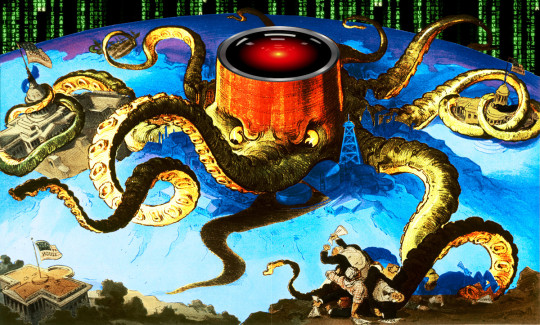
Support me this summer on the Clarion Write-A-Thon and help raise money for the Clarion Science Fiction and Fantasy Writers' Workshop!

My latest Locus Magazine column is "Unpersoned." It's about the implications of putting critical infrastructure into the private, unaccountable hands of tech giants:
https://locusmag.com/2024/07/cory-doctorow-unpersoned/
The column opens with the story of romance writer K Renee, as reported by Madeline Ashby for Wired:
https://www.wired.com/story/what-happens-when-a-romance-author-gets-locked-out-of-google-docs/
Renee is a prolific writer who used Google Docs to compose her books, and share them among early readers for feedback and revisions. Last March, Renee's Google account was locked, and she was no longer able to access ten manuscripts for her unfinished books, totaling over 220,000 words. Google's famously opaque customer service – a mix of indifferently monitored forums, AI chatbots, and buck-passing subcontractors – would not explain to her what rule she had violated, merely that her work had been deemed "inappropriate."
Renee discovered that she wasn't being singled out. Many of her peers had also seen their accounts frozen and their documents locked, and none of them were able to get an explanation out of Google. Renee and her similarly situated victims of Google lockouts were reduced to developing folk-theories of what they had done to be expelled from Google's walled garden; Renee came to believe that she had tripped an anti-spam system by inviting her community of early readers to access the books she was working on.
There's a normal way that these stories resolve themselves: a reporter like Ashby, writing for a widely read publication like Wired, contacts the company and triggers a review by one of the vanishingly small number of people with the authority to undo the determinations of the Kafka-as-a-service systems that underpin the big platforms. The system's victim gets their data back and the company mouths a few empty phrases about how they take something-or-other "very seriously" and so forth.
But in this case, Google broke the script. When Ashby contacted Google about Renee's situation, Google spokesperson Jenny Thomson insisted that the policies for Google accounts were "clear": "we may review and take action on any content that violates our policies." If Renee believed that she'd been wrongly flagged, she could "request an appeal."
But Renee didn't even know what policy she was meant to have broken, and the "appeals" went nowhere.
This is an underappreciated aspect of "software as a service" and "the cloud." As companies from Microsoft to Adobe to Google withdraw the option to use software that runs on your own computer to create files that live on that computer, control over our own lives is quietly slipping away. Sure, it's great to have all your legal documents scanned, encrypted and hosted on GDrive, where they can't be burned up in a house-fire. But if a Google subcontractor decides you've broken some unwritten rule, you can lose access to those docs forever, without appeal or recourse.
That's what happened to "Mark," a San Francisco tech workers whose toddler developed a UTI during the early covid lockdowns. The pediatrician's office told Mark to take a picture of his son's infected penis and transmit it to the practice using a secure medical app. However, Mark's phone was also set up to synch all his pictures to Google Photos (this is a default setting), and when the picture of Mark's son's penis hit Google's cloud, it was automatically scanned and flagged as Child Sex Abuse Material (CSAM, better known as "child porn"):
https://pluralistic.net/2022/08/22/allopathic-risk/#snitches-get-stitches
Without contacting Mark, Google sent a copy of all of his data – searches, emails, photos, cloud files, location history and more – to the SFPD, and then terminated his account. Mark lost his phone number (he was a Google Fi customer), his email archives, all the household and professional files he kept on GDrive, his stored passwords, his two-factor authentication via Google Authenticator, and every photo he'd ever taken of his young son.
The SFPD concluded that Mark hadn't done anything wrong, but it was too late. Google had permanently deleted all of Mark's data. The SFPD had to mail a physical letter to Mark telling him he wasn't in trouble, because he had no email and no phone.
Mark's not the only person this happened to. Writing about Mark for the New York Times, Kashmir Hill described other parents, like a Houston father identified as "Cassio," who also lost their accounts and found themselves blocked from fundamental participation in modern life:
https://www.nytimes.com/2022/08/21/technology/google-surveillance-toddler-photo.html
Note that in none of these cases did the problem arise from the fact that Google services are advertising-supported, and because these people weren't paying for the product, they were the product. Buying a $800 Pixel phone or paying more than $100/year for a Google Drive account means that you're definitely paying for the product, and you're still the product.
What do we do about this? One answer would be to force the platforms to provide service to users who, in their judgment, might be engaged in fraud, or trafficking in CSAM, or arranging terrorist attacks. This is not my preferred solution, for reasons that I hope are obvious!
We can try to improve the decision-making processes at these giant platforms so that they catch fewer dolphins in their tuna-nets. The "first wave" of content moderation appeals focused on the establishment of oversight and review boards that wronged users could appeal their cases to. The idea was to establish these "paradigm cases" that would clarify the tricky aspects of content moderation decisions, like whether uploading a Nazi atrocity video in order to criticize it violated a rule against showing gore, Nazi paraphernalia, etc.
This hasn't worked very well. A proposal for "second wave" moderation oversight based on arms-length semi-employees at the platforms who gather and report statistics on moderation calls and complaints hasn't gelled either:
https://pluralistic.net/2022/03/12/move-slow-and-fix-things/#second-wave
Both the EU and California have privacy rules that allow users to demand their data back from platforms, but neither has proven very useful (yet) in situations where users have their accounts terminated because they are accused of committing gross violations of platform policy. You can see why this would be: if someone is accused of trafficking in child porn or running a pig-butchering scam, it would be perverse to shut down their account but give them all the data they need to go one committing these crimes elsewhere.
But even where you can invoke the EU's GDPR or California's CCPA to get your data, the platforms deliver that data in the most useless, complex blobs imaginable. For example, I recently used the CCPA to force Mailchimp to give me all the data they held on me. Mailchimp – a division of the monopolist and serial fraudster Intuit – is a favored platform for spammers, and I have been added to thousands of Mailchimp lists that bombard me with unsolicited press pitches and come-ons for scam products.
Mailchimp has spent a decade ignoring calls to allow users to see what mailing lists they've been added to, as a prelude to mass unsubscribing from those lists (for Mailchimp, the fact that spammers can pay it to send spam that users can't easily opt out of is a feature, not a bug). I thought that the CCPA might finally let me see the lists I'm on, but instead, Mailchimp sent me more than 5900 files, scattered through which were the internal serial numbers of the lists my name had been added to – but without the names of those lists any contact information for their owners. I can see that I'm on more than 1,000 mailing lists, but I can't do anything about it.
Mailchimp shows how a rule requiring platforms to furnish data-dumps can be easily subverted, and its conduct goes a long way to explaining why a decade of EU policy requiring these dumps has failed to make a dent in the market power of the Big Tech platforms.
The EU has a new solution to this problem. With its 2024 Digital Markets Act, the EU is requiring platforms to furnish APIs – programmatic ways for rivals to connect to their services. With the DMA, we might finally get something parallel to the cellular industry's "number portability" for other kinds of platforms.
If you've ever changed cellular platforms, you know how smooth this can be. When you get sick of your carrier, you set up an account with a new one and get a one-time code. Then you call your old carrier, endure their pathetic begging not to switch, give them that number and within a short time (sometimes only minutes), your phone is now on the new carrier's network, with your old phone-number intact.
This is a much better answer than forcing platforms to provide service to users whom they judge to be criminals or otherwise undesirable, but the platforms hate it. They say they hate it because it makes them complicit in crimes ("if we have to let an accused fraudster transfer their address book to a rival service, we abet the fraud"), but it's obvious that their objection is really about being forced to reduce the pain of switching to a rival.
There's a superficial reasonableness to the platforms' position, but only until you think about Mark, or K Renee, or the other people who've been "unpersonned" by the platforms with no explanation or appeal.
The platforms have rigged things so that you must have an account with them in order to function, but they also want to have the unilateral right to kick people off their systems. The combination of these demands represents more power than any company should have, and Big Tech has repeatedly demonstrated its unfitness to wield this kind of power.
This week, I lost an argument with my accountants about this. They provide me with my tax forms as links to a Microsoft Cloud file, and I need to have a Microsoft login in order to retrieve these files. This policy – and a prohibition on sending customer files as email attachments – came from their IT team, and it was in response to a requirement imposed by their insurer.
The problem here isn't merely that I must now enter into a contractual arrangement with Microsoft in order to do my taxes. It isn't just that Microsoft's terms of service are ghastly. It's not even that they could change those terms at any time, for example, to ingest my sensitive tax documents in order to train a large language model.
It's that Microsoft – like Google, Apple, Facebook and the other giants – routinely disconnects users for reasons it refuses to explain, and offers no meaningful appeal. Microsoft tells its business customers, "force your clients to get a Microsoft account in order to maintain communications security" but also reserves the right to unilaterally ban those clients from having a Microsoft account.
There are examples of this all over. Google recently flipped a switch so that you can't complete a Google Form without being logged into a Google account. Now, my ability to purse all kinds of matters both consequential and trivial turn on Google's good graces, which can change suddenly and arbitrarily. If I was like Mark, permanently banned from Google, I wouldn't have been able to complete Google Forms this week telling a conference organizer what sized t-shirt I wear, but also telling a friend that I could attend their wedding.
Now, perhaps some people really should be locked out of digital life. Maybe people who traffick in CSAM should be locked out of the cloud. But the entity that should make that determination is a court, not a Big Tech content moderator. It's fine for a platform to decide it doesn't want your business – but it shouldn't be up to the platform to decide that no one should be able to provide you with service.
This is especially salient in light of the chaos caused by Crowdstrike's catastrophic software update last week. Crowdstrike demonstrated what happens to users when a cloud provider accidentally terminates their account, but while we're thinking about reducing the likelihood of such accidents, we should really be thinking about what happens when you get Crowdstruck on purpose.
The wholesale chaos that Windows users and their clients, employees, users and stakeholders underwent last week could have been pieced out retail. It could have come as a court order (either by a US court or a foreign court) to disconnect a user and/or brick their computer. It could have come as an insider attack, undertaken by a vengeful employee, or one who was on the take from criminals or a foreign government. The ability to give anyone in the world a Blue Screen of Death could be a feature and not a bug.
It's not that companies are sadistic. When they mistreat us, it's nothing personal. They've just calculated that it would cost them more to run a good process than our business is worth to them. If they know we can't leave for a competitor, if they know we can't sue them, if they know that a tech rival can't give us a tool to get our data out of their silos, then the expected cost of mistreating us goes down. That makes it economically rational to seek out ever-more trivial sources of income that impose ever-more miserable conditions on us. When we can't leave without paying a very steep price, there's practically a fiduciary duty to find ways to upcharge, downgrade, scam, screw and enshittify us, right up to the point where we're so pissed that we quit.
Google could pay competent decision-makers to review every complaint about an account disconnection, but the cost of employing that large, skilled workforce vastly exceeds their expected lifetime revenue from a user like Mark. The fact that this results in the ruination of Mark's life isn't Google's problem – it's Mark's problem.
The cloud is many things, but most of all, it's a trap. When software is delivered as a service, when your data and the programs you use to read and write it live on computers that you don't control, your switching costs skyrocket. Think of Adobe, which no longer lets you buy programs at all, but instead insists that you run its software via the cloud. Adobe used the fact that you no longer own the tools you rely upon to cancel its Pantone color-matching license. One day, every Adobe customer in the world woke up to discover that the colors in their career-spanning file collections had all turned black, and would remain black until they paid an upcharge:
https://pluralistic.net/2022/10/28/fade-to-black/#trust-the-process
The cloud allows the companies whose products you rely on to alter the functioning and cost of those products unilaterally. Like mobile apps – which can't be reverse-engineered and modified without risking legal liability – cloud apps are built for enshittification. They are designed to shift power away from users to software companies. An app is just a web-page wrapped in enough IP to make it a felony to add an ad-blocker to it. A cloud app is some Javascript wrapped in enough terms of service clickthroughs to make it a felony to restore old features that the company now wants to upcharge you for.
Google's defenstration of K Renee, Mark and Cassio may have been accidental, but Google's capacity to defenstrate all of us, and the enormous cost we all bear if Google does so, has been carefully engineered into the system. Same goes for Apple, Microsoft, Adobe and anyone else who traps us in their silos. The lesson of the Crowdstrike catastrophe isn't merely that our IT systems are brittle and riddled with single points of failure: it's that these failure-points can be tripped deliberately, and that doing so could be in a company's best interests, no matter how devastating it would be to you or me.

If you'd like an e ssay-formatted version of this post to read or share, here's a link to it on pluralistic.net, my surveillance-free, ad-free, tracker-free blog:
https://pluralistic.net/2024/07/22/degoogled/#kafka-as-a-service

Image: Cryteria (modified) https://commons.wikimedia.org/wiki/File:HAL9000.svg
CC BY 3.0 https://creativecommons.org/licenses/by/3.0/deed.en
522 notes
·
View notes
Text
♡ Budget / Expenses Spreadsheet ♡ (Customizable)

Hi guys!!! I've gotten a few asks about budgeting and handling money better — a post on that is in the works now — but I figured I would share the budgeting/expenses Google sheet that I made and have been using for about two years.

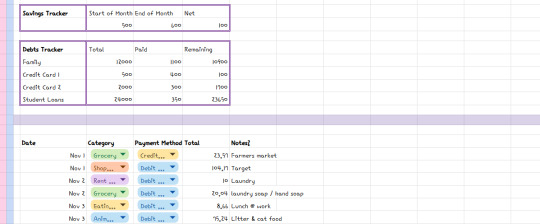
This is a link to the spreadsheet & under the "read more" I'll kind of go into detail about what it is, how to use it, and how to customize it to fit your needs.
I like using Google Docs because it's easy to access on both phone and computer so regardless of where you are you can quickly open it up and note down if you spend something or see how much you have left to spend on something. (I'll make a follow-up post at some point going over the process of making a reasonable budget and all that good stuff a little bit later, this post is really just about what the document is and how to use it ^-^)

You need to make your own copy of the spreadsheet so that you can start to edit and use it! When you open up the document click on "File" then select "Make a Copy"


2. Now that you have your own copy let's look at the "Monthly Expenses" part of the document.
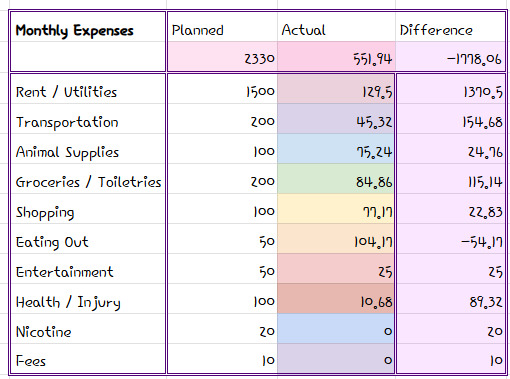
This is the main part - your monthly expenses. I have it broken down into different categories so I can see how much money I'm spending on what, and notice if I'm spending too much on something. DO NOT EDIT THE COLOURED BOXES. Those are auto-updating, so you don't want to edit them or they won't auto-update anymore.
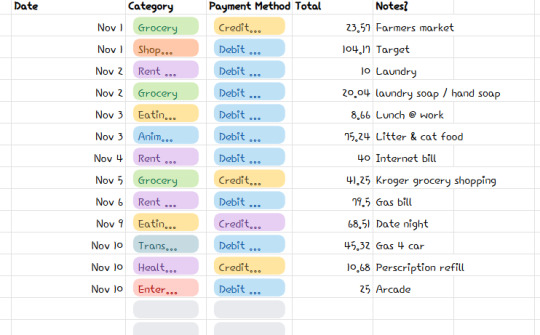
The monthly expenses table pulls data from this table down towards the bottom of the spreadsheet. This is where you can note down anything you spend money on. You have a drop-down menu to select what category the purchase falls under, what payment method you used, the total, and any notes about the purchase. The document will automatically add up any values for a category and put the total into the table at the top - that way you don't have to do any math at all its awesome.
CHANGING CATEGORY NAMES (please pay attention to this since if you change category names without following these steps it will not work anymore) You need to change the category name in 3 different places.
1- Change the name on the "Monthy Expenses" table 2- Change the name in the formatting code in the "actual" part of the "monthly expenses table" When you click on the value under the "actual" part of the monthly expenses table you should see something that looks like "=SUMIF(E36:E1002, "Eating Out", G36:G1002)" then just change "Eating Out" to whatever your preferred category name is.
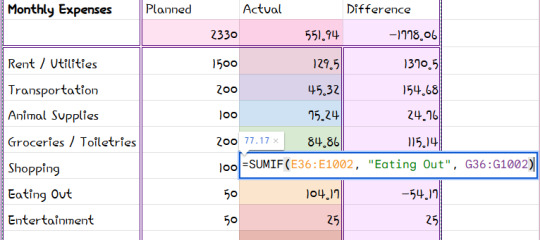
3- Change the name in the drop-down options of the daily purchases part of the document When you click on the dropdown menu, click the edit button. That will open the menu on the right-hand side of the screen, scroll down and change whichever category name you want to edit to the preferred category name.
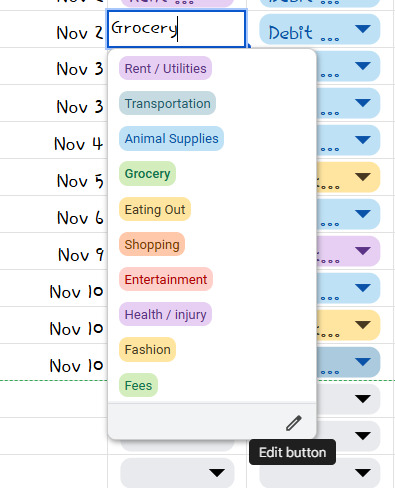
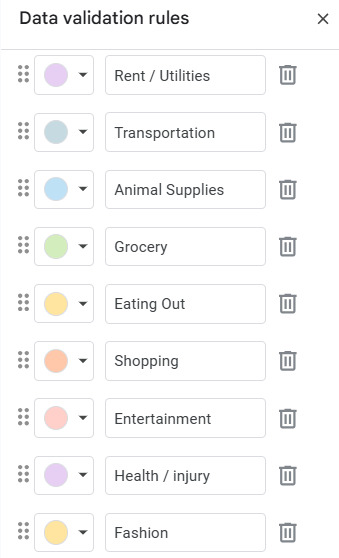
Make sure that it is spelled the SAME WAY in all 3 of these places or it will not work properly!! I also made a short video showing how I would change the category "nicotine" to "fashion" to show you how it's done:
Once you've done that everything should auto-update properly, and the spending chart will update with the new name as well no need to edit the pie chart at all.
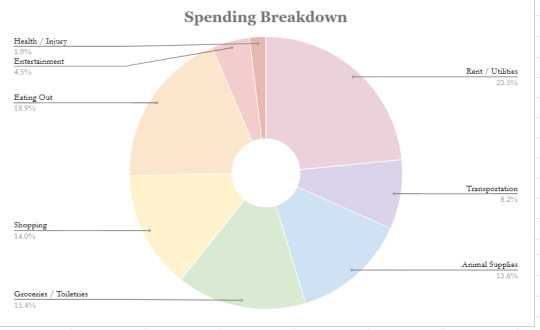
And this pie chart will automatically update to show you a visual of how much money you're spending on what (comparatively).
If you want to change the category names of the payment methods those you can just change in the drop-down edit menu - the names of those do not affect anything so you can change their names, add new ones, delete ones, whatever you want to do and you don't have to worry about anything else getting messed up.

3. The monthly income table is just tracking what your projected income vs. actual income was for the month
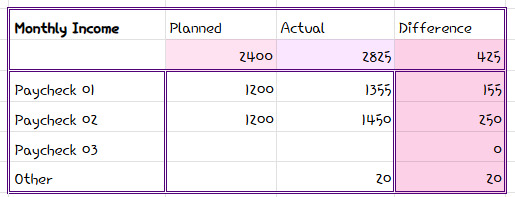
again, don't type in the coloured boxes, they will automatically update. I mostly use this as a sort of starting point for planning my budget so that I can sort of see how much money I expect to have for the month so I can plan around that number. This doesn't affect anything else in the document, so if you don't like it you can honestly delete it.

4. Savings and Debts trackers
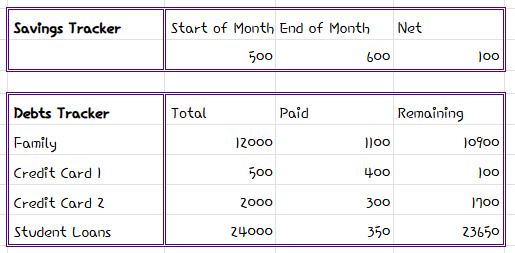
Again, these aren't tied to anything else in the document so you can delete them if you like. I mostly use these to see whether my savings are going up or down, and keep track of how much money I owe to other people T-T. One note I will make is that the debts tracker does not take interest into account so I honestly just manually update it every month. (It is not a very extensive tracker, and if you need to manage debt there are honestly better ways to do it than this, I just kind of have it in here as a visual for myself).

If you run into any issues or have any trouble formatting / customizing the document feel free to shoot me a DM or an ask and I will help you out!
And again, post about budgeting and fiscal responsibility and all that jazz coming later, but for now try it and see if you like it! See if you can log every purchase you make for a week! That way you'll be able to start seeing what you tend to spend your money on the most, and how much money you spend, and then we can kind of build a budget later on with that in mind ^-^
˗ˋˏ ♡ ˎˊ˗ I hope it's helpful! ˗ˋˏ ♡ ˎˊ˗
#expense tracking#resource#I mean I guess it's a recourse#I don't know how to tag this#documents#jiraiblr#landmineblr#i hope this all makes sense!!!
106 notes
·
View notes
Text

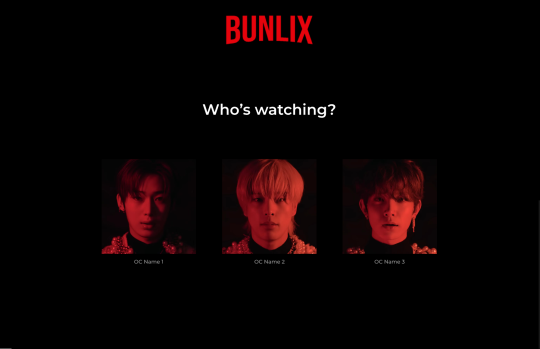
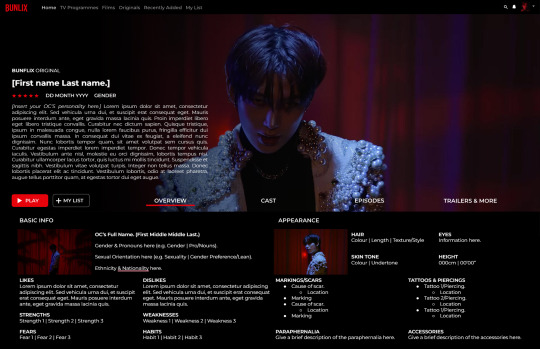

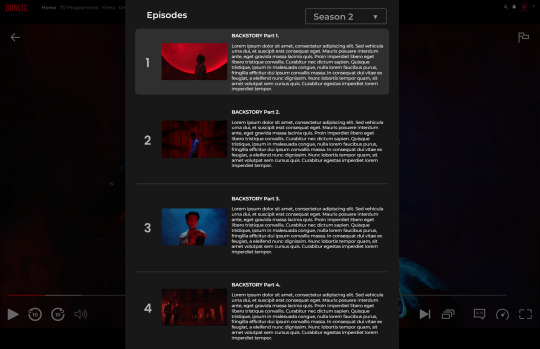

13. bunlix original (third free template!)
Introducing "13. Bunlix Original", a Netflix-inspired Google doc template for single muses based around the aesthetic of ENHYPEN's 'Bite Me'. This document includes custom-made elements to include space for general information, personality, character details & quirks, relationships, and character backstories.
PERSONAL UPDATE: I know I haven't posted in a bit, unfortunately, my life outside of tumblr has become a lot busier, so my frequency of templates might be less. BUT I am hoping to finish at least two more this month!
notes/rules
editing and modifications are welcome once you purchase the template.
all drawings and images in this document are custom-created (or in the case of the pictures, edited) by me. If you would like to take elements from this document, you will need to credit me as an inspiration or the creator of that element(s).
resizing or moving objects/images can throw off the document, so be careful.
do not remove my watermark/credits!
please like or reblog this post if you use my template! ♡
how to use
click the source link above
download the template via my payhip
follow the instructions left on the note attached
once you receive access to the template, go to file → make a copy
how to edit
to most easily put in your own images, go to replace image then choose how you wish to replace it (either uploading a file or via the image's URL).
this document includes drawings. Double-click the drawing/image on the bottom left or top right corner, then click the edit tab. this will take you to a page where you can replace, edit or delete features of the image
for those who cannot see the source link, here is the link itself: https://payhip.com/b/e3JqH
#google doc#google doc template#google docs template#discord rp#google docs#netflix#netflix inspired#netflix template#aesthetic template#single muse#template#oc template#character template#free template#bun: original#bun: google docs
668 notes
·
View notes
Text
On writing fanfiction
Exactly one person hinted that this might be helpful and I thought, well, okay, why not? tonight I have the time. I've been collecting thoughts for awhile and posting fic for more than a decade (writing longer than that!) so why not create a little manifesto of sorts.
A [not at all comprehensive] guide to writing and sharing fic - for beginners - from someone who is serious about writing fanfic as a hobby but casual about everything else:
On logistics:
Where should one write? I use google docs. Recently there's been some discussion about not using gdocs because of AI concerns, and I think if you are sharing nsfw files with other users there is a nebulous risk of losing access to the file... so I've heard. Tbh I cannot speak to the actual risk of either of these things. But I like gdocs because it's free and I can access the same doc from my phone as my desktop which is good for on-the-go thoughts. Other programs that people like are scrivener (costs money - but everybody who uses it says its worth it) and libre office (I tried this and didn't like it, but only because I'm used to gdocs). There are other programs out there, but these are the ones I feel I hear about the most. For me personally, I also have a notebook. If I'm inspired and want to get some scene or dialogue out quickly, writing analog is fastest for me and I find my thoughts flow well like that too.
Where should one post? Archive of our own dot org. There are other fic sites (wattpad) but none of them have the legendary tagging system that ao3 has - more on this later. On ao3 you will need to create an account (if you need an invitation, I'm not sure if you do, but if you do I will personally give one to you, just dm me). But you can post fic under your user handle or anonymously. When you browse the site, you will see that everything is separated by fandom, then by pairing (though non pairing/romance or 'gen fic' is fine too), then by characters involved, then other tags. I imagine it's overwhelming if you are not there a lot, but when you post, the form guides you for what to fill out (e.g. you will fill out the fields before you drop in your fic). You can always edit later if you want to change things around, but ao3 does not have an algorithm, so people will find your fic based on 1) the time it was originally posted or more likely 2) the tags that give an idea of what the story is about. I could write for ten thousand years about the merits of ao3, but like most things, you have to just get in there and try it out.
Other people who are smarter than me and know more than me can write and have written huge, in depth explanations for how to use features, and work skins, and the beautiful bells and whistles of ao3, but here is the down and dirty kind of explaining for sorting and filtering. I'm not going for nuance, I'm going for broad stroke understanding, and the nuance can come later. On ao3 fic 'metrics' we have hits (clicks), kudos (basically a 'like'), and bookmarks -- as a reader you can sort by any of these, which basically means you can move more popular fics to the top based on your preferences. And as a writer, it means you are hungry for people to kudos or bookmark your fic so that it potentially gets more eyes on it. Well, that's kinda putting the cart before the horse so to speak, if you're just getting started, but it is nice for your work to get feedback.
Tagging beyond pairing and character is important because it's how people will differentiate your fic from the others. This is things like 'canon compliant' or 'post canon' or 'coffee shop au' or 'enemies to lovers' or 'anal sex' or 'Bottom Shiro' or literally anything. Literally anything. These can be big tags ("wrangled tags") that everybody uses commonly enough that they are their own kind of category ('dom/sub') or random silly things you want to advertise with (e.g. 'blatant disregard for hoverbike safety'). You can add as many tags as you like. There are no rules to writing fanfic but tagging content warnings appropriately is important to readers, and you will find YOUR people most expediently if you tag honestly and robustly. Again, I could write 150k just about the intricacies of using ao3 as a reader AND writer, but 1) there are other folks who have done it better already/know more than me and 2) you really just gotta get in there and play around to understand it.
I am always happy to talk about fic and so if any questions about logistics arise, I will happily try to help. ao3 also has help pages and support. One random but important note is that the crux of ao3 is that it is an ARCHIVE only (so there is minimal moderation of content, to an extent ) and not for profit, so you must never ever mention money exchanged for fic there. if a work is a commission or something of that nature, that is fine, just mention it on socials or elsewhere, do not put put that in the summary or author's notes, etc as it will cause your work to be removed for legal reasons.
On writing:
The best advice for writing is the easiest to give and the most useless to receive: you really do just have to write. Write, write, write. That is the only way you will find what works for you, the only way you will get better, the only way you will tell your story. Since my goal is not to be patronizing, I will not say that. I will try to give some random and interesting tips that really get to the heart of what I feel you need to know (in my world of healthcare we call this type of information 'clinical pearls' LOL)
Getting started -
It's likely that there is a specific scene you want to write and that's why you're considering starting a piece in the first place. That's grand. All you need is that little bit of inspo!! when you're crafting a story around that point, try to drop the reader in at a time that is interesting/exciting/unexpected. if you're just starting out and all you have is the inspo scene, write that. then you can decide if that gives a full enough picture on it's own (fics don't have to be hugely long, esp in the beginning of your writing journey) or what else you want to add to be satisfied.
For me, I usually have an idea in a google doc and some bits of dialogue or random stuff that goes along with the idea as I got random inspiration. then when I want to start on a new work, I try to conjure up one scene that will get me rolling -- from there I can just keep writing what comes next. As a less experienced fanfic writer I wrote more outlines and was more methodical. when I'm writing now I don't really know how things end (except for in a very vague sense) until I'm actually writing the ending. this makes writing a lot of fun for me. when I write fic, I am my own audience and I am writing for my own entertainment.
Establish a setting -
I feel like a lot of less experienced writers fail to place these characters in a setting. If I open a fic and it's just mostly dialogue (chat fic, I'm looking at you, darling) I'm thinking ?? okay ?? are they floating in space??? what is happening?? I don't like chat fic. Give people an anchor at the very least and try to remember that the reader doesn't have your Mind's Eye and they will likely not know what you are imagining unless you explicitly state it. this might seem obvious, but writers who are good at setting are remarkably good at writing, I think. also, I do not like to open with dialogue but that's personal preference.
Magical paperclip moment -
Along the same lines as grounding the characters in setting, I like to add in what I call in my mind 'magical paperclip moments.' This is something I made up (I'm insane, btw) after being really impressed with a writer's work (I think in the hetalia fandom, I wish I knew the exact fic because it quite literally changed my life). anyways, the characters are having a conversation in the fic, and the author randomly added in a line about one of the guys playing with a paperclip while they talked. It did not move the plot forward, it was not important to the guy's character, it was just a random idiosyncrasy that made the story feel real. magical stuff. I love that.
Decide on vibes-
This is a big one for me!!! at the beginning of my working google doc I usually have some random notes, a running list of tags, etc, but I also have a category for ~vibes~ In other words, I am thinking hard about what kind of overall feeling I want the piece to have, and I am thinking about what kind of feeling I want to invoke in the reader. should this story be dreamy? Gritty? Fast paced? Emotional? And then it really helps direct the scenes because I'm trying to stay within that framework of vibes for the reader. So I try not to write just the story alone, but also the tone of the work. Also having a theme in mind, or a motif that runs throughout, can really make a work powerful
The POV has a voice-
This depends on the style of the writer, but for my work, it's HUGE. If I'm writing from the POV of one character and it is identical to the POV of another character, I am not doing a good job. through the way things are described, the tone, whether the writing is more formal vs casual, all of this can help establish the voice of the fic. the fics that I've written that are the most stand out, or the most entertaining, or the most popular - all of them have a very distinct character voice to them that matches the story and the tone of the fic, and helps characterize the pov. it's not for everyone, but to me this is the single most important thing to elevate a story into something special
Writer's block-
Getting stuck is inevitable. When you're stuck, you have two options: grind it out or let it simmer. Grinding through the block is not for the faint of heart - by this I mean literally chain yourself to the laptop and poke out word after painful word until the words start to flow. This could take hours and hours and barely result in a paragraph.... that you might scrap later. But, sometimes it can be enough to break through the block. If you let it simmer, that's more gentle - take a shower, go to the grocery store, go on a walk, etc. If that's not enough, read, watch tv, consume some other kind of media that fills your cup. Let your brain work out the block in your background processes. return to the fic when you really want to and then you will be ready.
Two things I always think of when I don't know what comes next in a story: What would I as a reader be so insanely stoked to see happen next??? and What would be unexpected or exciting here?
On community:
You can't really talk about the transformative work of writing fanfiction without mentioning the fandom as community. I have a lot of precious thoughts about this, but I will keep things brief here. Fic is shared in a dialogue with other fans - it is not sold, it is not beholden to canon, it is not for the satisfaction of the original work. People are writing purely because they want to and that is an amazing and powerful thing !!!!!
Comments -
Well we all want comments because we love to hear about how people love our take on our precious blorbos. But you have to leave comments on other folks work too. truly, as a writer, you have to. I think this is a good way to start finding your people: read fic that excites you -> leave a comment there -> see who else left comments -> read their fics -> look at their bookmarks -> read more fics -> leave more comments -> you will start to 'know' the people who like the same thing as you. you will start to have readers! you will find writers that inspire you! you will get better at writing! you will be in fandom!
One important thing to note for new to fanfic folks is that construct criticism of any kind is not welcome on fanfiction. it's not needed because the author is SHARING fic with you - I am by no means the first person to say this, but think of it like going to their house and eating their home cooked meal... if it's not to your taste, peace out. just leave. no need to let them know. this is doubly true if you don't like the content of a fic. simply leave...it's not for you, so find something that is. or make your own thing. As a writer, if someone is not following this basic fandom decorum, and they hurt your feelings with a nasty comment, you need to remember that they are the one in the wrong - they are being rude and you are justified to feel irritated or hurt. if you've tagged your own work appropriately, then you haven't done anything wrong by writing your fic.
Social media-
Two things about writing and social media (fandom circles of socials). 1. be insane about one particular thing, that will be your brand and bring you people and be fun. you don't have to do this, you could just be insane about a lot of things, but I think having one niche interest that really gets you going is good. that's my opinion! 2. never publicly discredit your work. don't say "LOL I suck at summaries" in the summary of the fic. don't put yourself down even if you have doubts about your writing....you can improve without doing that!!!
Sharing your fics in a post on twitter or bluesky is a good way to get more people to click on them, esp if you are a new writer. sometimes you will see people make pretty little title cards - they are making these on canva dot com and it is easy and free to use. I love doing this and it took me awhile to figure out how my favorite writers were making such pretty title cards for their fics. so now you know!
On concluding:
I can't imagine the resiliency of the readers who made it to this point!!!!!!!!! WOW !! Obviously I will post this with the caveat that I am just one little girlie and there are a lot of fic writing folks out there, some of them much more well spoken and more knowledgeable and better writers than me, and maybe if they posted a similar essay, it would have completely different content. that is okay and I am not sad about it. in other words, I do not pretend to be an authority on any of this, I am just a person who loves writing fanfiction and this is what I would tell a complete beginner <3 thank you for reading <3
58 notes
·
View notes
Text
“I’m scared to pirate stuff - ” do it scared!*
*with Firefox and Adblock and a VPN and -
If you want a nonspecific, nonexhaustive “where do I even start” guide…
Sail the cyber seas at your own risk!
Streaming - “I want to watch xyz”
This is normally what most people want when they talk about pirating.
Use Firefox with uBlock Origin and additional privacy add-ons such as PrivacyBadger, TrackMeNot, etc.
Free VPNs are out there. Get one - but vet it’s efficacy. My go-tos are Proton VPN, or Windscribe if you plan to do a bit of torrenting.
What is torrenting? How does it work? Here’s a guide!
Back to streaming -
Make sure that a) you’ve got your Mozilla browser with all its adblocking private glory, and b) you’ve got a VPN turned on to hide what you’re doing in that browser from your ISP (internet service provider).
Now you need to actually find a site to stream from. This is the tricky part, because openly sharing these sites will get them taken down if they’re talked about widely enough. (Remember how tiktok idiots got zlibrary taken down?)
You’re going to have to talk to people on forums. You’re going to have to experiment with sites you find yourself. Search for ‘x online free’ and look at the links that come up - is the preview text mangled or clickbaitey? Are there Reddit threads about that website confirming or denying its content? A good rule of thumb is to ignore the top result or two - copycats of good streaming sites will often buy out the top result spot. Eventually, you’ll develop a good gut feeling and understanding of what a good site ‘looks like’ from the results page alone.
However, there are some places that compile good sites that haven’t been nuked by lawyers (yet) - check out r/FMHY! The masterposts are actively curated and updated when a site goes down or is found to have malicious downloads.
Remember - loose lips sink ships. No tweeting (xeeting?) or Facebook statuses about your new favorite piracy website and where you found it. Even posting to tumblr (kind of like this…) isn’t a great idea if you want those websites to stay under the radar and stay accessible. Nobody talks, everybody walks (away with their share of pirate booty)
If you aren’t downloading media, pick pretty much any site and watch away! Adblock and Firefox will keep away pop-ups and other annoying ads, and your VPN means your ISP can’t tell that you’re visiting an unofficial streaming service.
Note: In my experience, I’ve never heard of visiting a site and watching stuff on it infecting or otherwise compromising your computer. That tends to come from misclicks on invisible or overwhelming pop-up ads that redirect you to an automatic download or similarly malicious bullshit. If you’re using Firefox and uBlock, you shouldn’t be in any danger of an accidental redirect.
Downloads - “I want to keep xyz”
This is the realm of pirate archiving - you’re keeping files physically on your hard drive, an external hard drive, or burning a disk.
Adblock + Firefox browser? Check. VPN on? Check.
Go to your streaming site of choice - most if not all have download options. You can download those files or, manually, right click and save the video file from the webpage as an mp4. I honestly don’t know if there’s a difference in quality or more danger in clicking the download buttons, but regardless -
Run that puppy through VirusTotal.com! It’s a reliable browser based virus checker - if the file is too large, use a local virus checking program (your native Windows Defender on Windows computers or, I prefer, Malwarebytes)
Generally mp4 and mp3 files are clean - choose where to save them for the long term, and bam! Free forever media.
Optionally, I also upload mp4 files to a named Google document - this way I can easily share them or make them findable through a ‘xyz Google doc’ search for others :]
Torrents - “I want to keep and share xyz”
I’m not going to go into this subject in depth because, honestly, it’s not something I do regularly.
See the previously linked Torrenting guide for information on how the process works, and check out r/FMHY for recommendations and warnings about different torrenting clients (I’ve personally only used qBittorrent - I’ve heard to stay away from the Pirate Bay and Bittorrent.)
As with streaming, turn on that VPN baby! You’re going to need one that supports peer-to-peer (p2p) connections, so Proton’s free version is a no-go. Windscribe is what I’ve used for torrenting (and it’s a good free VPN on its own - I’m just partial to Proton). You get 10GB every month on Windscribe’s free version, which is more than enough for a few movies/a season or two of your favorite show.
(Bigger torrents like video games are easily 30+ GB, so be prepared to either pay for a no-limit premium account or spend a few months downloading your files in chunks.)
VPN on? Double check.
Boot up your torrenting client - I use a slightly out of date version of qBittorent, but there are other options. The Reddit thread and previously linked torrenting guide have a few dos and donts of selecting a client, so be thorough before you download your client of choice.
This is getting into the logistics of torrenting a bit, so forgive me if this is vague or incorrect, but now you need a torrent seed. These will be .tor files found through pirating websites or archives - these are rarely malicious, but it’s good to run any piracy related download through something like VirusTotal.com or scan it with a local program like Malwarebytes.
You open your seed file in your client and wait. A ‘healthy’ seed tends to have lots of seeders and few leeches, but sometimes you’re stuck with an obscure seed you just have to wait for.
Your torrented files have fully downloaded! Now what? a) keep your client open and seed those files for others as long as you want to - sharing is caring! and b) run those files through a security program like Malwarebytes (not sponsored it’s just the only program I’m familiar with).
Be wary of what gets flagged - sometimes the files seem important, but are just trojans, and likewise sometimes they seem malicious, but are just cracked software getting flagged by your system. It’s good to check and see if others have had a problem with this particular torrent before - Reddit threads from 2008 are your long dead friends.
And that’s about it. Feel free to correct me if anything I’ve recommended is malicious or outright wrong. I’ve been doing this for years and haven’t had an active problem to my knowledge, so if there is something fishy with how I do things, I am a statistical outlier and should not be counted.
I wish you smooth sailing and strong winds in your ventures me hearties!
Obligatory ‘don’t pirate small author’s or artist’s works what the fuck dude’ statement.
#ra speaks#piracy#pirating#pirate to make hondo ohnaka proud#I’ve seen so many people on my streaming piracy post bemoaning that they don’t know how like !!!!#congrats you get to learn without the middle school trial and error phase we zillenials had (RIP family computer 2004-2009)#I genuinely think piracy has gotten easier/safer than it used to be. that or I’ve gotten smarter. which is also likely.
422 notes
·
View notes
Note
Hi! I just wanted to let you all know that the link you shared to an article on historical views of blindness in the ask you answered about disabled characters in medieval fantasy settings was a PDF that wasn’t very screen reader accessible. I just tried to read it myself as a blind person and really struggled. If you can find an alternative source for it where it’s more of a plain text document instead of a PDF, that would likely make it much more accessible.
Hello!
Unfortunately it looks like the only other versions of the document are behind a paywall.
I did, however, spend a couple hours or so messing around with Google Docs, Word, and a dozen or so useless sites before figuring out how to upload a plain text copy so hopefully this works [Link]? If you download the .txt (Plain text) file, you should be able to access it. I gave it a try with my screenreader and it was compatible but I know that some of them are a bit picky so hopefully it works.
If anyone knows of a better way to share the document, please please please let me know. I am terrible with technology.
Cheers,
~ Mod Icarus
68 notes
·
View notes
Note
As someone who's college age: yeah, there's a TON of people my age who don't know how things work and don't try to learn. Can't unzip a zip file, want to know where to download anime but haven't tried looking it up, ask things on subreddits a Google search or quick search on the wiki would answer, ask questions answered in FAQs or by professors or in the syllabus, say they can't download and install a new browser or app or program because they don't know how and they never think to look up how to do so, go months without logging into their student email because no one explained to them how to do so and they never thought to ask anyone how to do it, go months without washing their laundry because they don't know how and they also don't know how to look up instructions on how to do it, don't know how to cook and can't Google a recipe so they throw things in a pan and pray it works out, don't understand how to back up files, don't know how to attach a pdf to an email to send to a professor, cannot manage to put stuff on a USB drive + go to the library + print it off of the library computer, etc.
I spent most of freshman year teaching people things. The year after, my patience got more frayed and "Google it" started coming out of my mouth a lot more. This last year I gave up and now if people fuck themselves over, that's their decision. I'm not going to stand there begging people to do basic things they should already know how to do.
It was really funny when someone from Career Services came to talk to us about resumes and said we didn't need to put down 'can use Microsoft Excel' on there because everyone knew that and all but three people said actually no, they didn't. People who are 40+ really think we're all good at tech by default, like we fall out of the womb clutching a little phone already making spreadsheets in Excel or coding computers or whatever.
Meanwhile in reality you see a ton of people posting on tumblr going, "How do I post fic on tumblr?" whose blogs proudly state that they're under 18. The thought that you could just type into a Word doc and then copy and paste onto here never hits. And it's not going to.
I hate to break it to millennials and older people but yeah, actually, my generation does in fact have morons. We're not a moron-free demographic. I'm pretty sure moron-free demographics don't exist, tbh.
--
It infuriates me that my father (in his 80s) is always saying to me that he needs to find a 12-year-old to explain his tech to him. I (40s) keep telling him it's more like a bell curve or something. We had a blip of people being taught in school or having their asses kicked about technology. But then it went away again.
I think we made computers and then phones much more accessible, which is great, but we forgot we still need to teach people things. I know not everyone got explicit instruction in school even in my era, but it seems like the US, at least, phased some of that out as we started assuming The Youth automatically knew it all.
That said... in my day, college freshmen were also terrible about doing their laundry, so some things never change.
261 notes
·
View notes
Note
Hello! Another writing question! Which word processor do you use? I've been relying on Google Docs, but want to upgrade. TYIA!
I've been using Scrivener for many, many years now. Like a shocking number of years, given I am the kind of person who picks up every new program or app with 'this will surely fix me' energy, only to discard them when they did not, in fact, fix me (or they stopped providing The Dopamine, or I started tracking too many things and things got too convoluted, or--)
Before I was using Scrivener, I was using Word (or an open source alternative, depending), and I use Google Docs for editing, but Scrivener, and its ability for me to have a work space that includes all my projects (they're all in one project called 'kitchen sink', unless it's a novel I'm prepping for publication, in which case it gets its own project). It's basically the ideal program for someone who flits from piece to piece, and it's insanely customizable, which is probably the reason I've never left for more novel pastures: if I change the way I want to work, I can alter it to suit.
If you're a one project at a time person, I still pretty heartily recommend it, because it has spots for ancillary bits that you need to have access to but don't necessarily fit in the main file (character profiles, a scene you cut but really like a few lines from, research, etc)
It can do a ton for you if you put the time into learning it (I not only write in it, but also format my books for publication within it), but you don't need to use all its bells and whistles.
Most exciting of all: you buy it once. Like. Seriously. Not even once per laptop or whatever, though I'd still be hyped about that.
They also have a really generous trial where you can use it for 30 days (not calendar, but days of use -- if you used it once a week, say, that'd be 30 weeks).
I'm genuinely really happy to stump for them because I use it like...every single day and every time I've had trouble with it, it's because of something I did or didn't do (say, forgot to set up auto backup) rather than a problem with the program. They've also been actively refining it and working on it the entire time I've had it. In a world that's gone all in on apps over programs, subscription based models over ownership, and general enshittification, it's a product that just...works. I love it. Could not more highly recommend at least giving the trial a shot. (it's available for Mac, PC, and IOS)
28 notes
·
View notes
Text
suggestions for the amrev resource folder that nobody asked for?
i have the structure worked out and want to start adding resources in there: if anyone has any suggestions on edits to make beforehand, pls do so!
Shared Google folder with subfolders:
Events (Resources centered on "events"/"periods": aka Pre-War, Wartime Experience, Constitutional Convention, Federal Period, maybe even just "General")
Topics (Sexuality, Religion, Race, Fashion, etc.)
Figures (Hamilton, Burr, Jefferson, etc. with folders of their own separating their biographies, letters, primary sources, etc.)
Primary Sources (Inside: Newspapers, Letters, etc.)
Inspired (Section for media based on amrev period: thinking Hamilton, 1776, George Washington: Founding of a Nation, Turn. For instance, someone shared their Hamilton musical commentary book, so that'll be a resource under this folder)
NA (resources that don't fit and/or are about things that are too sparse for a specific category quite yet)
Along with this, I have made:
Masterlist: Google Sheet with every single resource in the folder. I'm working on making it sortable by tag (for larger category, specific topics, people, etc.)
Wishlist: A Google Sheet where you can add resources you've like to see but have no access to. Once they've been added to the folder, they'll be crossed off.
Submission Form: Anonymous Google form for anyone to submit resources. File upload or long answer section where you can give me contact info/link to your own folder are both options.
Help & Advice Form: If something doesn't make sense or you think there's a better way to do things, submit here.
RateTheResource: Google doc where you can write out your review/thoughts on a specific resource you are familiar with. I thought it might be helpful to provide context, especially for biographies, on bias level, etc.
#amrev folder#amrev#amrev fandom#alexander hamilton#george washington#thomas jefferson#aaron burr#amrev history#john laurens#marquis de lafayette#historical hamilton#hamilton#james madison#turn washington's spies#turn amc
26 notes
·
View notes
Text
Dev Pile 2025-06 — Starter Kit
Making dev piles is a new experience for the blog in that they are explicitly deliberately timely. Where most of the work on this blog is thrown weeks, sometimes months in advance if it doesn’t fit neatly in a single spot, I am trying to make sure I write any given Dev Pile article covering the ‘week before’ the article goes up. This is a new kind of work for me, and it’s necessitated working ahead.
The week this article is being ‘written in’ is the week after Cancon. I had a plan for this week: I was going to spend the week writing an article developing the game dev I did, at cancon, in the dull periods at the table between the sales. Thing is, this year, that did not happen – Cancon was pretty much completely constant, so much so that the first day I didn’t even notice I never pulled out my notebook and what notes did get taken during the whole event were surface, or sketching out some minor ideas.
Therefore instead of a single intense focus here, this is going to be something of a hello and hey, here’s how to get started article about game making, tools, and prototyping.
Who Can Make Games?
You can make games. I can make games. Anyone who wants to can make games. The access you have to industrial scale production equipment to make the game you’re designing into something that looks like conventional product is a little more attainable than you may think, thanks to modern tools.
The core of you making games is this: Can you explain a set of rules to another player that let them understand how to play the game?
Great, then you’ve made a game. The next step is working out how to make that game the kind of game you want it to be. And to paraphrase what Adam Savage once said, the difference between doing game development and screwing around is just writing things down.
Tools
First things first, if you have a tool you like for any of the stated purposes, then you should use the tool you like. The tools I describe here should all be free, but that can make them less convenient in ways you may not like.
To write rulebooks, I use LibreOffice. This is a text editor in the same vein as Pages and Word, and much like Google Docs. We’ve pretty much solved ‘writing in a document for a computer user to read’ as a format, and that format has been kinda the same for thirty years. Notably, a formal editor like this lets you do tables and give texts formatting entries like heading styles, which means you don’t have to work to translate that stuff to a website like a wordpress content management system. Under the hood, these two things know how to talk to one another.
Notepad is a valuable tool as well for when you need ‘scrap’ text – no formatting, just some numbers or the like, but literally anything will do here.
Almost inevitably any given game design I have will need a spreadsheet. Sometimes a spreadsheet lets me present a skeleton of a game, with say, a sheet of 52 entries that just indicate the information on a card’s face. That means I use LibreCalc, but I only started using that seven months ago, when I learned about the IFS function. The version of Excel I was using from 2007 didn’t have this ‘new’ functionality, and I found that very useful. You may ask: How often do you need ‘IFS’ in game development and the answer is never. There are definitely thihngs I can use spreadsheets for, but these functions are not super necessary.
To do visual editing I use GIMP, pronounced ‘noo-imp,’ because gimp is a silly word to use in everyday conversation and it has worn its welcome out in my tongue. GIMP is a program that takes some getting used to, but the heart of what it is is a powerful photoshop-level program that puts almost everything it has directly under your control, including warp tools, healing tools, stamp tools and other simple filters. I will usually use GIMP to generate a template file or example for how a card should look, and then, when I want to put those cards into a file to make a pdf for printing, I turn to…
Scribus! Scribus is my layout and DTP program that I avoid using in every situation I can. I dislike Scribus interface a lot, and as a result, I route around it – I try to make sure that if I’m doing something in a design that Scribus ‘could’ do, I will ensure that Scribus is the only thing that can do it, and if something else can do it, I’ll do it that way. This is a combination of familiarity and convenience: Scribus is by no means a bad program, I’m sure, but I don’t like using it and it feels very easy to break things, which means when I do use it, I’m probably using it ‘wrong,’ and a Scribus expert would want to correct my technique.
For making simple slideshow videos, where I just show a thing, talk about it, and move on, I use the program OBS, which you can use for rules tutorials or explainers. OBS has its own ability to do slides – which you can make in a slideshow program like Google Slides or powerpoint or Prezi if you like – and then you talk over it, advancing the slides in OBS. It’s a very powerful, very flexible tool, but I can understand if it’s a bit overwhelming to start with.
If you want to record audio for your game, which is a cool thing to do, I use Audacity. It’s a simple audio program if you’re just using it for its basic functions, but it can be great if (for example) you want to record audio diaries of your creation process.
Also, mixed in with this is, cardboard, paper, scissors and glue. Playing cards need a standardised form so you can make a ‘blank’ deck of cards by taking an ordinary deck of cards and putting large, white, laundry stickers on each face, ‘wiping’ it so you can write what you want on the face.
Art Though?
I use free art where I can. There’s a lot of art assets, paid and free over on itch.io, which you can definitely use to make your game work look more interesting than base. And of course…
Bandaid tearing off time,
There are free image generators that you can use if you are comfortable with that. My advice is that you should only ever use generators for ‘zero value’ forms of media; that is, nothing you intend to sell and nothing you intend to use as identifying for yourself; don’t use a generator for a logo for your identity or brand, for example, because that’s uncopyrightable and then someone can just copy it. Even if they don’t, the fact they can undermines the copyright value of designing your own logo and title.
But yeah, image generators are available online. When I need an image for an example, the one I recommend using is dezgo, because it doesn’t require a login, doesn’t require you to pay money, and all it asks of you is time to let it finish working. You’re not going to get timely bulk media out of it, but that means, in my mind, that any artwork it generates is going to be worth scrutinising and editing to make it more appropriate to your needs. This is part of a greater conversation, but for now, the important thing is that if you’re going to use generative tools you need to make sure you recognise what they’re bad at and what they’re bad for.
Getting Started?
Alright, you have some tools to make what you have in mind more possible. What I recommend you do, and I will delve more into this later in the week, is make a prototype, and then, once you have the prototype, look at it seriously.
You’re going to have to get your head around the question what do I like without asking the followup question why at first. What is it about your prototype that satisfies you? What would you change if you could? Why isn’t it satisfying to you, what about it makes you concerned. Are there things you haven’t thought about because of biases you have? Is it a game you can’t play with one hand?
The point is the prototype marks the point you start finding out. You don’t need a perfect game to prototype – indeed, I have a lot of very ugly games as prototypes and I think those ugly prototypes work really well as a place to start working out what to do next.
Check it out on PRESS.exe to see it with images and links!
13 notes
·
View notes
Text
Writing is thinking, but it’s thinking slowed down — stilled —
... And that’s one of the arguments for writing well — for taking the time and summoning the focus to do so. Good writing burnishes your message. It burnishes the messenger, too.
You may be dazzling on your feet, an extemporaneous ace, thanks to the brilliant thoughts that pinball around your brain. There will nonetheless be times when you must pin them down and put them in a long email. Or a medium-length email. Or a memo. Or, hell, a Slack channel. The clarity, coherence, precision and even verve with which you do that — achieving a polish and personality distinct from most of what A.I. spits out — will have an impact on the recipients of that missive, coloring their estimation of you and advancing or impeding your goals.
If you’re honest with yourself, you know that, because you know your own skeptical reaction when people send you error-clouded dreck. You also know the way you perk up when they send its shining opposite. And while the epigrammatic cleverness or audiovisual genius of a viral TikTok or Instagram post has the potential to shape opinion and motivate behavior, there are organizations and institutions whose internal communications and decision-making aren’t conducted via social media. GIFs, memes and emojis don’t apply.
When my friend Molly Worthen, a history professor at the University of North Carolina at Chapel Hill and a frequent contributor to Times Opinion, took the measure of the influential diplomat Charles Hill for her 2006 book “The Man on Whom Nothing Was Lost,” she noted that a principal reason for his enormous behind-the-scenes influence was his dexterity with the written word. He took great notes. He produced great summaries. He made great arguments — on paper, not just on the fly.
Worthen noted in her book that “transmitting ideas into written words is hard, and people do not like to do it.” As a result, someone who performs that task gladly, quickly and nimbly “in most cases ends up the default author, the quarterback to whom others start to turn, out of habit, for the play.”
Good writing announces your seriousness, establishing you as someone capable of caring and discipline. But it’s not just a matter of show: The act of wrestling your thoughts into logical form, distilling them into comprehensible phrases and presenting them as persuasively and accessibly as possible is arguably the best test of those very thoughts. It either exposes them as flawed or affirms their merit and, in the process, sharpens them.
Writing is thinking, but it’s thinking slowed down — stilled — to a point where dimensions and nuances otherwise invisible to you appear....
I think you can take the “pen and paper” out of the equation — replace them with keystrokes in a Google Doc or Microsoft Word file — and the point largely holds. That kind of writing, too, forces you to concentrate or to elaborate. A tossed-off text message doesn’t. Neither do most social media posts. They have as much to do with spleen as with brain.
What place do the traditional rules of writing and the conventional standards for it have in all this? Does purposeful, ruminative or cathartic writing demand decent grammar, some sense of pace, some glimmer of grace?
Maybe not. You can write in a manner that’s comprehensible and compelling only or mostly to you. You can choose which dictums to follow and which to flout. You’re still writing.
But show me someone who writes correctly and ably — and who knows that — and I’ll show you someone who probably also writes more. Such people’s awareness of their agility and their confidence pave the way. Show me someone who has never been pressed to write well or given the tutelage and tools to do so and I’ll show you someone who more often than not avoids it and, in avoiding it, is deprived of not only its benefits but also its pleasures.
Yes, pleasures. I’ve lost count of the times when I’ve praised a paragraph, sentence or turn of phrase in a student’s paper and that student subsequently let me know that the passage had in fact been a great source of pride, delivering a jolt of excitement upon its creation. We shouldn’t devalue that feeling. We should encourage — and teach — more people to experience it.
— Frank Bruni, from "A.I. or no A.I., it pays to write — and to write well" (NY Times, December 21, 2023)
98 notes
·
View notes
Text
Tiny Tip #2
So, you've decided to take up creative writing! You open up your preferred writing program and go to open up your last file, which is your 20,000 word first draft of a novel-- until, uh oh! An error message pops up, saying the file is corrupted, can't be retrieved, etc!
Or, say lightning strikes your house, and fries your computer--!
Or, a cat comes scampering across your computer desk, sending your computer crashing to the floor where it promptly explodes in a million prices --!
How to you avoid losing all your hard work in these scenarios?
✨By Backing up your work regularly✨
You should take steps right now with any important documents you have on your computer!
Here's some very simple ways you can back your work up, from completely free to paid services:
Each day that you make changes to your main writing document(s), make a brand new copy with the "Save-as" function, and label each one with that day's date, so you have a complete timeline of documents from day one to current day, instead of all being one single document.
Email the Docx / ODF file to yourself once a day, and if you have more than one email, or a trusted friend/family member, email it to them as well in case you somehow lose access to your account.
use Google Docs to back up your documents or for cross-platform writing, or if you use Google Docs as your main writing program, back up your writing locally to Libreoffice and all other methods mentioned above. It only takes 1 issue with logging into your account or a service outage to lose access to your work on google docs!
Use 4thewords as another online cloud service to back up your writing and write cross platform
Use A cloud drive service to back up your works once a day, such as Google Drive, Mega, One Drive, IDrive, Sync Drive, etc to back up your works once a day
Use Calibre to convert your document into an ebook format or PDF, and send it to your phone as an extra backup, and a handy way to reference your writing on the go.
use Google Docs to back up your documents or for cross-platform writing, or if you use Google Docs as your main writing program, back up your writing locally to Libreoffice and all other methods mentioned above. It only takes 1 issue with logging into your account or a service outage to lose access to your work on google docs!
#writing#tiny tips#BACK YOUR WRITING UP YOU NEVER KNOW WHAT WILL HAPPEN#BACK IT UP AT MINIMUM ONCE A DAY OR ANY TIME YOU MAKE MAJOR CHANGES#bold text#large text
20 notes
·
View notes
Text
hi everyone, long time no see. Life has been very, VERY hectic the past year, but I'm hoping to return to making templates again. This is sadly the only one I've done over the past 12 months, but hopefully it's alright :)


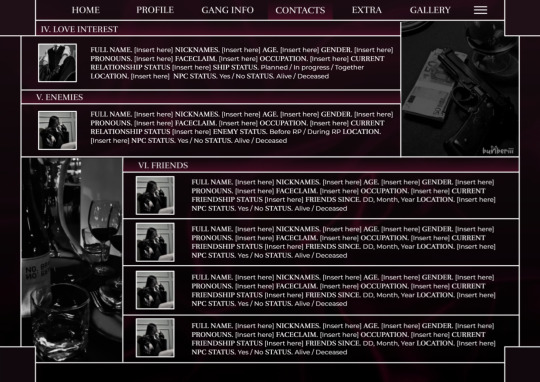
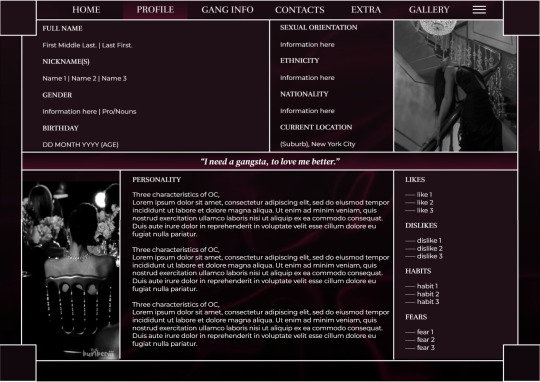
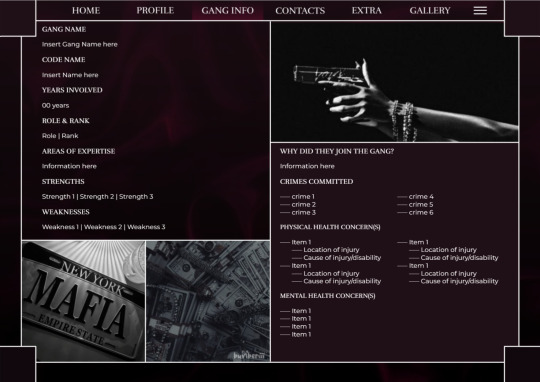

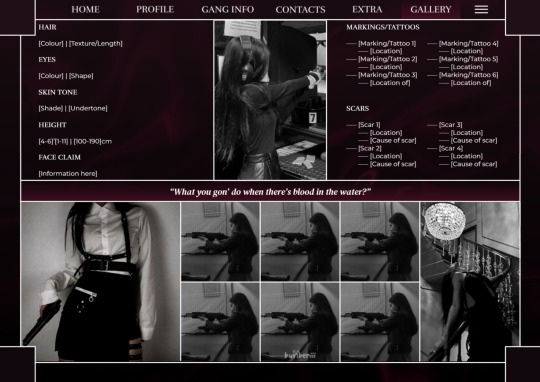

𝟏𝟒. 𝕻𝖔𝖎𝖘𝖔𝖓 𝖂𝖎𝖓𝖊
introducing "14. poison wine", a dark red aesthetic in-depth Google Docs oc template designed specifically for characters within a gang setting. This document includes space for general information, personality, and extensive character information such as hobbies and habits, character relationships, gang information, criminal history, and character backstories. feel free to edit this as much as you wish as long as you do not remove my credit.
editing and modifications are welcome once you purchase the template.
all drawings and images in this document are custom created (or in the case of the pictures, edited) by me. If you would like to take elements from this document, you will need to credit me as an inspiration or the creator of that element(s).
resizing or moving objects/images can throw off the document, so be careful.
do not remove my watermark/credits!
please like or reblog this post if you use my template! ♡
how to use
click the source link above
purchase the template via my payhip
follow the instructions on the downloaded note
once you receive access to the template, go to file → make a copy
how to edit
to most easily put in your own images, go to replace image then choose how you wish to replace it (either uploading a file or via the image's URL).
this document includes drawings. Double-click the drawing/image on the bottom left or top right corner, then click the edit tab. this will take you to a page where you can replace, edit or delete features of the image
for the custom-edited photos, I've linked a tutorial to how I created them in the zip file you'll receive after the purchase
#google doc#google doc template#google docs template#discord rp#bun: google docs#rp template#discord template#roleplay template#character template#mafiaaesthetic#mafiatemplate#mafiarp#crimerp#crimeaesthetic
35 notes
·
View notes
Text
RPF and archiving: the ethics of the wayback machine
it feels silly to talk about frerard in the same breath as digital preservation. but a few years ago i began noticing fics i had once loved were now deleted from ao3 and old livejournal links had become 404 errors. with the use of the wayback machine, i was able to retrieve some of these and i saved a few as google doc files for personal use.
i was originally planning to make this post as an offering to any folks still out there in the market for well-written bandom fic, providing a link to my drive where these fics can be found. or just as a reminder that far more things have been archived on wayback than you might think. but then i had to go and think about the ethics of the thing, and that gets tricky.
to be clear, i've made my peace with any ethical qualms regarding rpf itself. that's not what this post is about. rather, my concern lies with the authors of these fics. each presumably has their own reason for removing their works from ao3/lj. and we're talking about some big names in what is a very small world here - softlyforgotten, one of the joint authors of In Case The Scene Gets Nasty aka Fistfights, is an author whose work i was shocked to discover was scrubbed from the archive. by sharing work that these authors have chosen to delete, am i undermining their decisions to curate their online presence and artistic output? there are plenty of things i have posted online and then deleted that i would not want to be resurfaced and shared without my consent.
i love these fics, and truly wish to recommend them to others. and, as i said, the wayback machine is accessible and free to use. would sharing them be so bad? is this an offer anyone would want to take up in the first place?
i would appreciate hearing others' thoughts on this. i'm honestly not sure where i stand.
#who writes an actual blog post like this on tumblr??? idek i just think about this sometimes#ryden#frerard#peterick#bandom#petekey#my drive also contains z/tennessee and greta/vicky fic but i ain't tagging that lol
8 notes
·
View notes